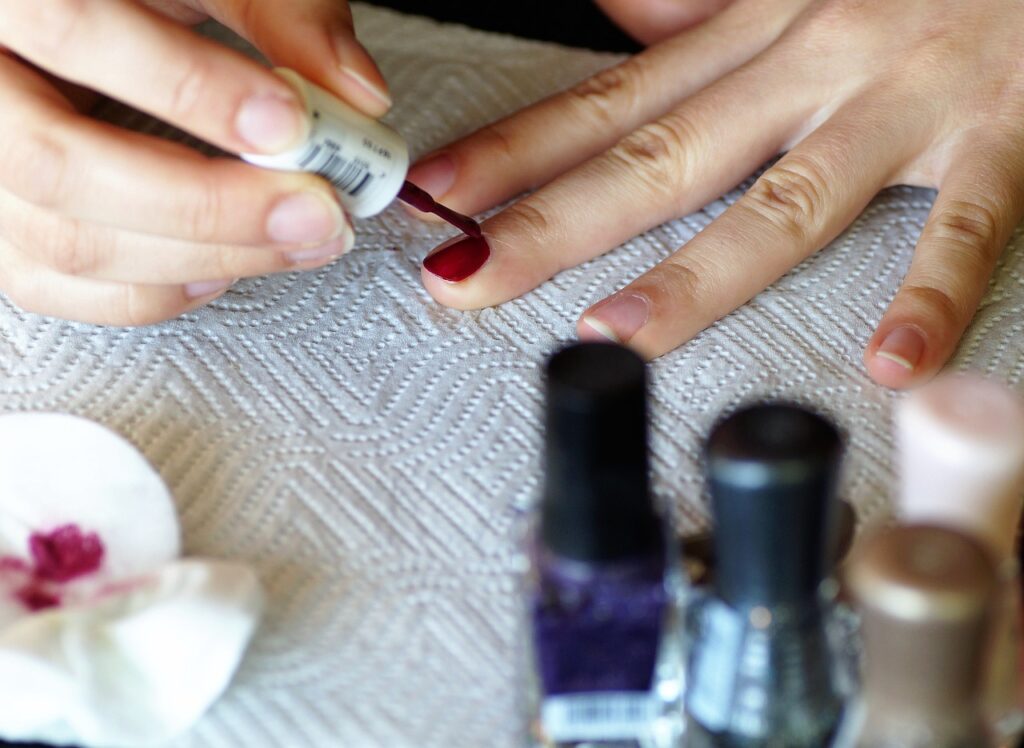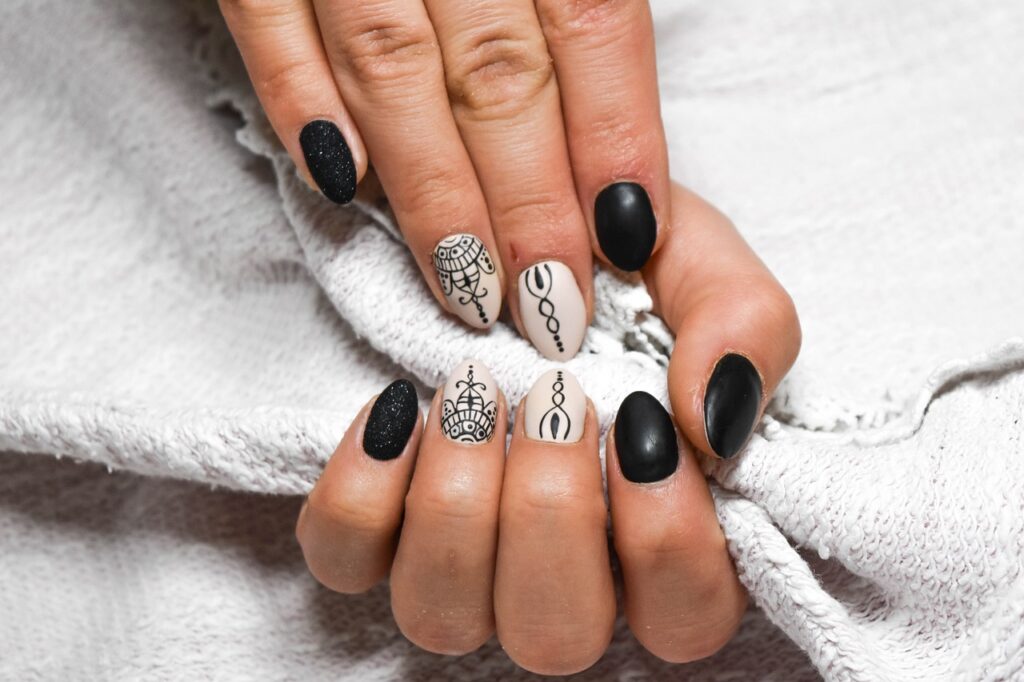Discover the tailored world of Nail Care for Different Nail Types—an essential guide to nurture and maintain the health of various nail textures. Understanding Nail Care for Different Nail Types is crucial, as each nail type requires specific attention and care. For brittle nails, prioritize strengthening treatments like nail hardeners or keratin-infused products. Embrace moisturizing routines for dry nails, utilizing hydrating oils or creams to restore moisture and flexibility.
Customize Nail Care for Different Nail Types by adapting your routine to suit the needs of your nails. For those with naturally strong nails, focus on maintaining their health with regular filing and gentle care. Soft or thin nails benefit from protective measures—opt for nail strengtheners or avoid excessive exposure to water to prevent weakening.
Explore specialized treatments catering to Nail Care for Different Nail Types. Incorporate nail masks or specialized serums designed to address specific concerns, such as peeling or ridged nails. These targeted treatments can help restore your nails to their optimal condition, promoting overall nail health.
Prioritize understanding your nails’ unique characteristics when devising your Nail Care for Different Nail Types routine. Experiment with different products and techniques, tailoring your care routine to effectively address your nails’ specific needs. By embracing this personalized approach to Nail Care for Different Nail Types, you’ll promote stronger, healthier nails, showcasing their natural beauty.
Table of Contents
Nail Care for Different Nail Types
| Nail Types | Care Tips |
|---|---|
| Brittle Nails | Keep nails short to prevent breakage. Use nail hardeners sparingly and moisturize regularly to prevent dryness. Avoid harsh chemicals and excessive filing. |
| Weak, Thin Nails | Avoid using acetone-based products. Apply nail strengtheners or protein-rich treatments. Keep nails trimmed and moisturized to prevent splitting. |
| Peeling Nails | Moisturize cuticles and nails regularly. Protect nails with a base coat. Avoid harsh chemicals and opt for non-acetone polish removers. |
| Dry, Dehydrated Nails | Moisturize nails and cuticles daily with oils or creams. Limit exposure to water and harsh soaps. Apply nail hydrators or treatments regularly. |
| Oily Nails | Keep nails short and file in one direction. Use non-oil-based products and clean nails with vinegar or alcohol before applying polish. |
| Ridged Nails | Buff nails gently to smooth ridges. Apply ridge-filling base coats to create a smoother surface before polish. Avoid excessive buffing to prevent damage. |
| Normal/Healthy Nails | Maintain a balanced routine of trimming, moisturizing, and protecting nails. Regularly use base and top coats to protect and maintain nail health. |
1. Nail Care for Different Nail Types: Essential Strategies for Healthy Nails
Nail care isn’t a one-size-fits-all routine. Different nail types require specific care strategies to maintain their health and appearance. Whether you have brittle, soft, or strong nails, understanding your nail type is the first step in nurturing them.
For brittle nails, hydration is key. Regularly applying a nourishing nail oil can significantly improve their condition. On the other hand, soft nails benefit from strength-building treatments like keratin-based creams or hardeners. Strong, healthy nails aren’t exempt from care either. They thrive with regular maintenance, such as proper filing and moisturizing cuticles.
Remember, overexposure to water and harsh chemicals can weaken any nail type. Hence, wearing gloves while cleaning or doing dishes is a wise practice. Moreover, a balanced diet rich in vitamins and minerals plays a crucial role in maintaining nail health across all nail types.
2. Understanding Your Nail Type: A Guide to Personalized Nail Care
To effectively care for your nails, you first need to understand your nail type. Generally, nails can be categorized as brittle, soft, strong, or a combination.
Brittle nails, which easily chip or split, often lack moisture. For these nails, hydration is crucial. Products containing hyaluronic acid or other moisturizing agents can be beneficial.
Soft nails, which bend easily and may feel thin, require strengthening treatments. Ingredients like biotin or calcium can help reinforce their structure.
Strong nails are the ideal, but they still need care to maintain their health. Regular shaping and cuticle care are essential, along with hydrating treatments to keep them resilient.
Knowing your nail type allows you to tailor your nail care routine, ensuring each nail receives the care it needs to stay strong and healthy.
3. The Best Nail Care Practices for Strong, Beautiful Nails
Achieving strong, beautiful nails is a combination of good practices and avoiding harmful habits. Here’s a rundown of the best nail care practices:
- Keep Them Clean and Dry: Prevent bacteria from growing under your nail by keeping your nails clean and dry.
- Gentle Grooming: Avoid harsh filing, which can cause nails to split. Use a fine-grit file and move in one direction.
- Moisturize: Just like your skin, your nails and cuticles need moisture. Invest in a good cuticle oil and hand cream.
- Wear Protective Gloves: When doing chores that involve harsh chemicals or prolonged exposure to water, wearing gloves can protect your nails.
- Healthy Diet: A diet rich in vitamins, proteins, and minerals is essential for nail health. Foods rich in biotin, such as eggs and nuts, can strengthen nails.
- Limit Professional Manicures: While professional nail treatments can be tempting, overexposure to chemicals and rough handling can weaken nails. Opt for gentler, more natural treatments.
4. Nail Nutrition: Diet Tips for Different Nail Types
Your diet plays a crucial role in the health of your nails. Different types of nails might require different nutritional focuses:
- For Brittle Nails: Increase your intake of fatty acids. Foods like fish, nuts, and avocados are great for improving nail strength.
- For Soft Nails: Biotin-rich foods can be a game changer. Incorporate whole grains, eggs, and dairy into your diet to help harden soft nails.
- For All Nail Types: Protein is the building block of nails. Ensure you’re getting enough protein through lean meats, beans, and tofu. Additionally, hydration is key. Drinking plenty of water helps in keeping nails and cuticles hydrated.
5. Professional Insights: Nail Care Techniques for Every Nail Type
Understanding Professional Techniques
Professionals in nail care often emphasize the importance of understanding the unique needs of different nail types. They recommend regular consultations to identify any changes or concerns with nail health.
Techniques for Brittle Nails
For brittle nails, professionals often suggest gentle buffing and the use of hydrating serums. Avoiding harsh nail treatments and opting for protective nail polishes can also be beneficial.
Caring for Soft Nails
Soft nails require strengthening treatments. Professional nail technicians might recommend specific fortifying nail polishes or treatments rich in calcium and biotin.
Maintaining Strong Nails
Even strong nails need care. Regular shaping, buffing, and moisturizing treatments are recommended. Professional advice often includes tips on preventing nail damage through lifestyle changes.
6. DIY Nail Care: Home Remedies and Solutions for Various Nail Types
Natural Moisturizers for Brittle Nails
For brittle nails, homemade oil blends with ingredients like jojoba oil, vitamin E, and almond oil can be effective moisturizers.
Strengthening Treatments for Soft Nails
Create a homemade nail soak with ingredients like lemon juice and olive oil to strengthen soft nails. Regular application can significantly improve nail strength.
General Nail Health Boosters
For all nail types, a mixture of coconut oil and honey can be a great nail and cuticle treatment. Applying this blend regularly can nourish and strengthen nails.
Preventive Care at Home
Maintaining a healthy diet and protecting nails during household chores are key aspects of nail care that can be managed effectively at home.
7. Advanced Nail Care: Innovations and Techniques for Specific Nail Concerns
Latest Innovations in Nail Care Products
Explore the newest products in nail care, such as advanced hydrating polishes and natural nail strengtheners. These products often incorporate cutting-edge ingredients and technologies.
Techniques for Restoring Nail Health
Learn about advanced techniques like laser treatments and specialized nail therapies for restoring the health of damaged nails.
Customized Nail Care Routines
Understand how to develop a personalized nail care routine that incorporates these advanced techniques and products, tailored to your specific nail type and concerns.
Future Trends in Nail Care
Stay informed about emerging trends in nail care, which might include innovative home remedies or professional treatments, offering enhanced care for different nail types.
Final Thoughts
In conclusion, the journey to achieving and maintaining healthy, beautiful nails is unique for each individual, depending on their specific nail type. Whether you’re dealing with brittle, soft, or strong nails, the key is to tailor your nail care routine to your specific needs. From understanding the basics of nail types and employing professional techniques to exploring DIY remedies and advanced innovations, there’s a wealth of knowledge and resources available.
Remember, the health of your nails is not just about aesthetics; it’s a reflection of your overall well-being. A balanced diet, proper hydration, and protective measures during daily activities play a crucial role in maintaining nail health. Moreover, staying informed about the latest trends and advancements in nail care can offer new solutions and improvements for your routine.
Ultimately, the journey of nail care is a personal and ever-evolving one. By respecting the unique nature of your nails and consistently applying the right care techniques, you can enjoy strong, healthy, and beautiful nails that not only look great but also signify a healthy lifestyle. Keep experimenting, stay informed, and most importantly, listen to what your nails are telling you about your health and care needs.
FAQs
1. What’s the best care routine for brittle nails prone to breakage?
Strengthen brittle nails by using a nail hardener or strengthening base coat regularly. Keep them hydrated with cuticle oil to prevent further breakage.
2. How can I care for soft and easily bendable nails?
Protect soft nails by avoiding excessive exposure to water and chemicals. Use a strengthening base coat and handle nails gently to prevent bending.
3. What’s the ideal care routine for nails that are prone to peeling?
Prevent nail peeling by keeping nails moisturized with a nourishing cuticle oil or cream. File nails gently in one direction to prevent further damage.
4. Are there specific nail care tips for ridged nails?
Buff ridged nails gently to smooth them out, but avoid excessive filing. Use a ridge-filling base coat to create a smooth canvas for polish application.
5. How should I care for thin and fragile nails?
Protect thin nails by avoiding harsh chemicals and opting for gentle polishes. Use a strengthening base coat and be cautious with nail length to prevent breakage.
6. Can I care for both dry and oily nails with the same routine?
Yes, maintaining a balance is key. Hydrate dry nails with cuticle oil and use a non-greasy moisturizer. For oily nails, focus on keeping them clean and trimmed.
7. Are there specific care tips for nails with uneven growth?
Gently file nails to encourage even growth and avoid harsh treatments that might exacerbate irregular growth patterns.
8. How should I care for nails that are both dry and brittle?
Hydrate dry and brittle nails with a nourishing cuticle oil or cream regularly. Use a nail strengthener to fortify nails and prevent brittleness.
9. Can I apply the same type of polish on all nail types?
Yes, but be mindful of the condition of your nails. Choose polishes that suit your nail type and consider using strengthening or nourishing formulas.
10. Are there general tips for healthy nail care that apply to all nail types?
Absolutely! Avoid using nails as tools, keep nails trimmed and filed, moisturize regularly, and give your nails occasional breaks from polish to maintain their health.



